Ellie Wiesel, 'A Sacred Magic Can Elevate the Secular Storyteller'
Sunday, November 19, 2017
Writers on [Writing]: Elie Wiesel
When Kafka...spoke of his wish to see his tales turned into prayers, he was more than likely thinking of Rabbi Nahman. Only he did the reverse: He transformed his prayers into tales. Was Rabbi Nahman then Kafka's teacher? Perhaps, but surely he is mine.
Sunday, October 15, 2017
Premiere of the short film 'Coffee' on the 20th October at UWA
My brother, Matthew Nicholas Phillips, is a physiotherapist by trade, but acts in plays, music-videos and short films.
He decided to adapt the first story that I'd written ('Coffee' published in Dotdotdash Magazine5 - I think in early 2011) in to a short independent film, with the aid of videographer and co-director, Alex Lorian. Their product, the short film 'Coffee', is premiering on the 20th this month at the University of WA (UWA) Social Sciences Lecture Theatre.
It was a pleasant surprise when Matthew told me he'd like to make a film of the story. My involvement was limited to meeting the exuberant, talented local cast and film-making team; and briefly explaining that 'Coffee' was my first story and a bit of a twisty, Dahl-esque one. I also mentioned that the dialogue was a little artificial, so that when they had the script (not adapted by me) to be wary of that element in the story and make the adequate changes.
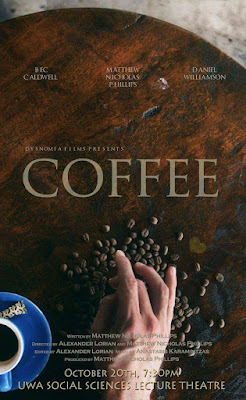 I feel as though I've evolved as a writer since my first couple of stories, but for my parents, my uncle Terry Pitsikas, and my brother, Matthew, 'Coffee' has always been their personal favourite. So much for the evolution of a writer...
I feel as though I've evolved as a writer since my first couple of stories, but for my parents, my uncle Terry Pitsikas, and my brother, Matthew, 'Coffee' has always been their personal favourite. So much for the evolution of a writer...I know I'm digressing here, but there are a couple of stories from the magazine 'Coffee' was published in that I really admire. One is 'R & L' is by Ryan O'Neill, a writer who always brings some originality to the short story form. 'R & L' cleverly explores lingering colonial values and attitudes, when an Australian volunteers to teach English in Rwanda. And 'Lollies' by David McLaren is an insightful Australian story about separation, family connections and disconnections.
As for the film, 'Coffee', I haven't seen it yet, so it'll be completely new to me on the night too. I felt it important that the filming team and actors had free artistic license. Film is a different genre, and I'm eager to see what creative arcs they have taken with the short work.
The film will premiere before a longer independent film, Subject 36 by Alex Lorian.
A bouzouki player has provided the playing for the soundtrack. Although in his teens, Anastasis Karamintzas is an incredible talent. Everything he does is crisp and sharp, he's up there with the best I've heard. I've been playing plenty of rembetika and laika in the car since I was sent a snippet of the soundtrack.
Tickets are $15 for the Premiere on
Friday 20th October, 7:30 at the UWA Social Sciences Lecture Theatre. There is an intermission after 'Coffee' before the film Subject 36. Click on Booking for the link and details.
Love to see you there!
Saturday, September 23, 2017
Paul West: Writers [on Writing]
Wednesday, August 16, 2017
Alice Walker: Writers [on Writing]
Meditation has been a loyal friend to me. It has helped me write my books. I could not have Possessing the Secret of Joy (about a woman who is genitally mutilated) without it; writing The Temple of my Familiar (my "great vision" novel of how the world got to be the way it is) would have been impossible. The Color Purple owes much of its humor and playfulness to the equanimity of my mind as I committed myself to a routine, daily practice.


Alice Walker, Metta to Burial and Other Marvels: A Poet's Experience of Meditation
Friday, July 14, 2017
Kurt Vonnegut Jr: Writers [on Writing]
A year after I got there, Engle rescued an economically drowning Richard Yates, one of the most excellent writers I ever met, a second time.
Kurt Vonnegut Jr, Despite Tough Guys, Life Is Not the Only School for Real Novelists
Both Kurt Vonnegut Jr and Richard Yates taught at the famed Iowa Writing Centre. The reasons I love the above line are threefold: firstly, it illustrates Vonnegut's admiration for Yates in spite of the pair's writing being poles apart; secondly, it shows Vonnegut's ability to see greatness in a writer whose commercial success arrived posthumously; and thirdly, it's about two writers I esteem – both authors were accomplished in their own unique ways.
Vonnegut is best seen as a satirist, not in the richer British tradition of Martin Amis or Will Self, but in a more minimalist, cutting way. Vonnegut's characters and their drives are relatively simplistic, but always fun and effective; his prose is spare, which helps add weight and an acidic sharpness to his jokes.
My uncle introduced me to Vonnegut in high school. It wasn't the traditional introduction through his two most celebrated works: Slaughterhouse-Five or Breakfast of Champions, but via Bluebeard, a novel that is still one of my favourites by Vonnegut. Bluebeard is the story of the fictitious Armenian-American minimalist painter Rabo Karabekian. It furthers Vonnegut's exploration of the psyche of prisoners of war that he is renown for.
Since Bluebeard, I've read plenty of Vonnegut. My preferred Vonnegut works are a little less known...well, lesser known for Vonnegut.
God Bless You, Mr. Rosewater is a satirical delight, examining all that is erroneous within the US. Wealth and power are as much the protagonists here as are Vonnegut's fairly uncomplicated, but once again, very effective, views of right and wrong.
Another favourite of mine is Timequake. Although maligned, especially by critics at the time, I see Timequake as a wonderful fusion of genre. It's really Vonnegut's philosophising on life as much as it is a fiction novel. In effect it's his blended non-fiction/fiction manifesto. In fact, most of the content in Vonnegut's A Man Without a Country: his criticisms of the US; his addressing of life's ironies; along with presenting his own beliefs and values, have actually all been laid out beforehand in Timequake. I've a feeling that down the track more readers will see the beauty of Timequake, especially when they realise A Man Without a Country is, in essence, a rewrite of Timequake, albeit in a more accessible form.
A couple of the interviews in God Bless You, Dr Kevorkian are also a hoot.
Which brings me to Yates, the writer Vonnegut justifiably labels 'excellent'. Although Raymond Carver is often seen as the iconic American short story writer, personally –for me at least– Yates towers over him (as does John Cheever), so it's refreshing to read about Vonnegut's appreciation of Yates, a writer whose work is so different from his own. The tips I've read or heard from numerous short story writers frequently reinforce their own personal writing styles rather than giving homage to the broader repertoire of effective styles out there. That's not the case here. While Vonnegut is a crisp minimalist satirist, Yates captures and expands on moments in time. Relationships are put under the microscope in displays of prose mastery. Yates' exploration of the human condition includes our sense of nostalgia, life's bitter turns, mislead lust and misplaced ambition, the marvel and tragedy of love and loss, along with the bittersweet aspects of life, in nearly every story. His two collections, Eleven Kinds of Loneliness and Liars in Love, magically capture the imaginings, along with the urban discontent, of everyday Americans. Although not nearly as funny as Vonnegut's work, these collections are two of my all-time favourites.
I hope Vonnegut's appreciation of Yates only furthers a reader's appreciation of Vonnegut. It evidently does for me.
Kurt Vonnegut Jr, Despite Tough Guys, Life Is Not the Only School for Real Novelists
Both Kurt Vonnegut Jr and Richard Yates taught at the famed Iowa Writing Centre. The reasons I love the above line are threefold: firstly, it illustrates Vonnegut's admiration for Yates in spite of the pair's writing being poles apart; secondly, it shows Vonnegut's ability to see greatness in a writer whose commercial success arrived posthumously; and thirdly, it's about two writers I esteem – both authors were accomplished in their own unique ways.
Vonnegut is best seen as a satirist, not in the richer British tradition of Martin Amis or Will Self, but in a more minimalist, cutting way. Vonnegut's characters and their drives are relatively simplistic, but always fun and effective; his prose is spare, which helps add weight and an acidic sharpness to his jokes.
My uncle introduced me to Vonnegut in high school. It wasn't the traditional introduction through his two most celebrated works: Slaughterhouse-Five or Breakfast of Champions, but via Bluebeard, a novel that is still one of my favourites by Vonnegut. Bluebeard is the story of the fictitious Armenian-American minimalist painter Rabo Karabekian. It furthers Vonnegut's exploration of the psyche of prisoners of war that he is renown for.
Since Bluebeard, I've read plenty of Vonnegut. My preferred Vonnegut works are a little less known...well, lesser known for Vonnegut.
God Bless You, Mr. Rosewater is a satirical delight, examining all that is erroneous within the US. Wealth and power are as much the protagonists here as are Vonnegut's fairly uncomplicated, but once again, very effective, views of right and wrong.
Another favourite of mine is Timequake. Although maligned, especially by critics at the time, I see Timequake as a wonderful fusion of genre. It's really Vonnegut's philosophising on life as much as it is a fiction novel. In effect it's his blended non-fiction/fiction manifesto. In fact, most of the content in Vonnegut's A Man Without a Country: his criticisms of the US; his addressing of life's ironies; along with presenting his own beliefs and values, have actually all been laid out beforehand in Timequake. I've a feeling that down the track more readers will see the beauty of Timequake, especially when they realise A Man Without a Country is, in essence, a rewrite of Timequake, albeit in a more accessible form.
A couple of the interviews in God Bless You, Dr Kevorkian are also a hoot.
Which brings me to Yates, the writer Vonnegut justifiably labels 'excellent'. Although Raymond Carver is often seen as the iconic American short story writer, personally –for me at least– Yates towers over him (as does John Cheever), so it's refreshing to read about Vonnegut's appreciation of Yates, a writer whose work is so different from his own. The tips I've read or heard from numerous short story writers frequently reinforce their own personal writing styles rather than giving homage to the broader repertoire of effective styles out there. That's not the case here. While Vonnegut is a crisp minimalist satirist, Yates captures and expands on moments in time. Relationships are put under the microscope in displays of prose mastery. Yates' exploration of the human condition includes our sense of nostalgia, life's bitter turns, mislead lust and misplaced ambition, the marvel and tragedy of love and loss, along with the bittersweet aspects of life, in nearly every story. His two collections, Eleven Kinds of Loneliness and Liars in Love, magically capture the imaginings, along with the urban discontent, of everyday Americans. Although not nearly as funny as Vonnegut's work, these collections are two of my all-time favourites.
I hope Vonnegut's appreciation of Yates only furthers a reader's appreciation of Vonnegut. It evidently does for me.
Saturday, June 10, 2017
Writers [on Writing]: John Updike
Updike refers to a favourite novel and protagonist of mine here in the whisky priest from Greene's classic The Power and the Glory.
I've read plenty of impressive commentary by Updike, but only one novel: The Witches of Eastwick. I was in high school when I read it and I'm not sure whether I was mature enough at the time to appreciate it. I'm saying this because only a couple of years ago, I read Updike's short story, 'A and P' and loved it. I wonder what my younger self would have thought?
Like the whisky priest in The Power and the Glory–no matter how bad it gets, he can still put God in men's mouths. We can still put truth in men's heads.
John Updike, Questions of Character: There's No Ego as Wounded as a Wounded Alter Ego
Saturday, May 20, 2017
Writers [on Writing]: Scott Turrow
"Was Ulysses really a great work of literature, if almost no one read it for leisure, and if the few who dared found it so taxing? What did writers owe their audience? How easy were we supposed to make things for them? And what were we entitled to demand in return?"
Scott Turrow, An Odyssey That Started with Ulysses
Saturday, April 15, 2017
Recent Book Launches, Ticonderoga's 21st Birthday at Swancon #42 and Current Reads
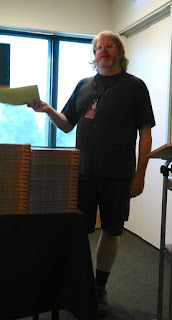
Ticonderoga Publications 21st Birthday (Swancon #42)
Ticonderoga Publications celebrated an incredible 21 years in typical TP style. Editor Liz Grzyb made over 50 delicious cupcakes with the TP logo in a variety flavours (I had the cookies and cream).
Russell B. Farr presented an intriguing overview of Ticonderoga's rich history, with respectful mentions given to numerous writers and editors, including Sean Williams (a Guest of Honour) and Jonathan Strahan, who were both in attendance.
 The celebration also included a post-launch and preview-launch. Alan Baxter's collection, Crow Shine was 'post-launched', and I bought a copy. It was great to meet and spend some time with Alan – one of the Guests of Honour at Swancon#42 –especially as we've been anthology mates a couple of times before (Dreaming of Djinn ed. Liz Grzyb and Bloodlines ed. Amanda Pillar).
The celebration also included a post-launch and preview-launch. Alan Baxter's collection, Crow Shine was 'post-launched', and I bought a copy. It was great to meet and spend some time with Alan – one of the Guests of Honour at Swancon#42 –especially as we've been anthology mates a couple of times before (Dreaming of Djinn ed. Liz Grzyb and Bloodlines ed. Amanda Pillar).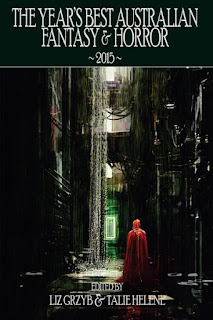
The Year's Best Australian Fantasy & Horror 2015 Ed. Liz Grzyb & Talie Helene was also 'preview-launched' at the 21st birthday. This was the 6th Volume so far. I read an excerpt from it, along with fellow Perthite, Stephen Dedman, and the ever affable, Cat Sparks.
My story 'Lady Killer', which I am very humbled to have included, is on the darker psychological side and doesn't contain as much dialogue as what I'd normally write. It was an enjoyable experience compressing the life's stages of a flawed protagonist into a short story. A sphinx felt the perfect vehicle with which to do this due to the Sphinx's famed riddle to Oedipus. The story was first published in the Aurealis Award winning anthology Bloodlines.
Alan Baxter pointed out at the reading that Liz Grzyb had written a dedication to me at the front of the anthology. This had me caught up in alliterative 'G's: I was gushing, gobsmacked and giddy - but also very thankful and appreciative.
A Few Other Buys (other than a stack of Ticonderoga books): I bought Lotus Blue, Cat Sparks' debut novel, one set in a dystopian Australia. It had a rave review in Locus Magazine recently. Last time Sparks was in Perth, she'd recently released her collection The Bride Price.
I also bought Thoraiya Dyer's debut novel Crossroads of Canopy, which also looks a treat.
And finally, Jonathan Strahan's newly released The Best Science Fiction and Fantasy of the Year: Volume Eleven. If it's anything like the one I read last year (Volume Six), it will be a bounty of rich stories. Strahan & Brown's Locus Awards Anthology played a huge role in inspiring me to write long short stories, and also understanding that the long short story/novelette genre has great value as a narrative vehicle.
I had a fab time in my couple of days at Swancon. I played a few games, bought a truckload of books, caught up with friends, and met some wonderful people. I also saw The Aurealis Awards, which had a superlative lineup of finalists. Please see the link below, as these awards, including the shortlists, usually make for wonderful reading. Congrats to all nominees.
https://aurealisawards.org/2017/04/14/announcing-the-winners-of-the-2016-aurealis-awards/
Launch of Rubik by Elizabeth Tan

Liz Tan and I studied a unit together on writing novels, I was a postgrad student, and Liz an undergrad, and you could see Liz' talent shining through in the class, her writing seemingly effortless in its fluidity and beauty – so it was a pleasure to attend the launch of Liz Tan's debut novel Rubik at Beaufort Street Books. It was an emotional evening for a variety of reasons, but also an exciting one. Rubik looks like a 'Tan Special' with a menagerie of quirky offbeat characters and weird events. It's also set right here in my hometown of Perth, but not quite the Perth as we know it...I did say menagerie, didn't I?
Current Reads
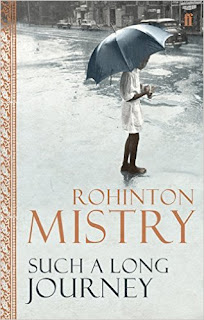 Just read Such a Long Journey by the magnificent Rohinton Mistry. It was Mistry's first novel and it isn't as large in scope or melodrama (which was fine with me) as the justifiably acclaimed A Fine Balance. The work explores a similar era in India's history, during what Mistry again portrays as Indira Gandhi's incredibly corrupt reign, but this time the backdrop focusses on the Indo-Pakistani 1971 War involving Bangladesh. Such a Long Journey fascinated me in a cultural sense, as it delves into the rich heritage of the Parsi community. The Zoroastrians of India are now a dwindling people, and this novel explores both the community and family's connection to the faith and culture along with its fragmentation, providing for a nostalgic, melancholy tone throughout, yet Mistry always manages to imbue his work with humour, making it all the more poignant and effective.
Just read Such a Long Journey by the magnificent Rohinton Mistry. It was Mistry's first novel and it isn't as large in scope or melodrama (which was fine with me) as the justifiably acclaimed A Fine Balance. The work explores a similar era in India's history, during what Mistry again portrays as Indira Gandhi's incredibly corrupt reign, but this time the backdrop focusses on the Indo-Pakistani 1971 War involving Bangladesh. Such a Long Journey fascinated me in a cultural sense, as it delves into the rich heritage of the Parsi community. The Zoroastrians of India are now a dwindling people, and this novel explores both the community and family's connection to the faith and culture along with its fragmentation, providing for a nostalgic, melancholy tone throughout, yet Mistry always manages to imbue his work with humour, making it all the more poignant and effective.Where Song Began by Tim Low: An epic feat. This is all about Australian birds. Our songbirds, parrots and cockatoos are long-lived and fiercely intelligent, and Low spells out why. The research, details and many anecdotes are superb.
And the next novel my bookclub has chosen is The Good People by Hannah Kent, as we all enjoyed Kent's debut novel Burial Rites.
Friday, March 24, 2017
Writers [on Writing]: Susan Sontag
"...to write is to practice, with particular intensity and attentiveness, to the art of reading."
Susan Sontag, Directions: Write, Read, Rewrite. Repeat Steps 2 and 3 as Needed
Sunday, January 15, 2017
Story in The Year's Best Australian Fantasy & Horror 2015 Ed. Liz Gryzb & Talie Helene
It's a privilege to have a story in the latest volume of The Year's Best Australian Fantasy & Horror Ed. Liz Grzyb & Talie Helene. Love the cover illustration.
 Kudos to Ticonderoga Publications – apparently it's the first time an Australian Year's Best genre series has run to 6 consecutive single-year volumes. The in-depth review of the field is of great historical value too; and the additional Recommended Reading List contains a treasure chest of stories to hunt down.
Kudos to Ticonderoga Publications – apparently it's the first time an Australian Year's Best genre series has run to 6 consecutive single-year volumes. The in-depth review of the field is of great historical value too; and the additional Recommended Reading List contains a treasure chest of stories to hunt down.
These anthologies are a showcase of not only the horror and fantasy genre but also Australian short fiction in general. The table of contents says it all.
The Year's Best Australian Fantasy and Horror, 2015 comes in an exquisite hardcover edition along with paperback and ebook, and will be available February/March 2017 (Amazon & Book Depository and elsewhere). Pre-orders are available via indiebooksonline (see the Ticonderoga website).
The below is from Ticonderoga Publications:
The latest volume in our award-winning Year's Best series, The Year's Best Australian Fantasy and Horror 2015 is weeks away. Editors Liz Grzyb and Talie Helene have selected 31 incredible stories, over 150,000 words, from Australia and New Zealand published in 2015.
In addition, the volume features an indepth review of the genre in 2015 and a recommended reading list.
In addition, the volume features an indepth review of the genre in 2015 and a recommended reading list.
The stories are
- Joanne Anderton, “2B”
- Alan Baxter, “The Chart of the Vagrant Mariner”
- Deborah Biancotti, “Look How Cold My Hands Are”
- Stephen Dedman, “Oh, Have You Seen The Devil”
- Erol Engin, “The Events at Callan Park”
- Jason Fischer, “The Dog Pit”
- Dirk Flinthart, “In the Blood”
- Kimberley Gaal, “In Sheep's Clothing”
- Stephanie Gunn, “The Flowers That Bloom Where Blood Touches Earth”
- Lisa Hannett, “Consorting With Filth”
- Robert Hood, “Double Speak”
- Kathleen Jennings, “A Hedge of Yellow Roses”
- Maree Kimberley, “Ninehearts”
- Jay Kristoff, “Sleepless”
- Martin Livings, “El Caballo Muerte”
- Danny Lovecraft, “Reminiscences of Herbert West”
- Kirstyn McDermott, “Self, Contained”
- Sally McLennan, “ Mr Schmidt's Dead Pet Emporium”
- DK Mok, “Almost Days”
- Faith Mudge, “Blueblood”
- Samantha Murray, “Half Past”
- Jason Nahrung, “Night Blooming”
- Garth Nix, “The Company of Women”
- Anthony Panegyres, “Lady Killer”
- Rivqa Rafael, “Beyond the Factory Wall”
- Deborah Sheldon, “Perfect Little Stitches”
- Angela Slatter, “Bluebeard's Daughter”
- Cat Sparks, “Dragon Girl”
- Lucy Sussex, “Angelito”
- Anna Tambour, “Tap”
- Kaaron Warren, “Mine Intercom”
Sunday, January 1, 2017
Reading and Writing Review 2016
Reading
2016 delivered some great reads, including a couple that I'm sure will remain all time favourites. I also finally succumbed to lifelong pressure to read To Kill a Mockingbird, not a bad thing mind you, it's as good as the preachers claim.
I'm happy to provide further comment on any of the below reads.
Books Read (bold: published in 2016)
Nights at the Circus Angela Carter
The White Tiger Aravind Adiga
To Kill a Mockingbird Harper Lee
The Sense of an Ending Julian Barnes (novella)
Ragtime E.L Doctorow
Nutshell Ian McEwan (novella)
Butcher's Crossing John Williams
The Portrait of Mrs Charbuque Jeffrey Ford
The Great Sea: A Human History of the Mediterranean David Abulafia (history)
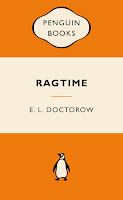 The Wasp Factory Ian Banks
The Wasp Factory Ian Banks The Pearl John Steinbeck (novella)
The Daughter Pavlos Matesis
The Best Science Fiction and Fantasy of the Year: Volume Six ed. Jonathan Strahan (anthology)
The Lightning Tree Patrick Rothfuss (novella from Rogues ed. George R.R. Martin & Gardner Dozois)
The Leaf in the Wind of All Hallows Diana Gabaldon (novella from Songs of Life & Death ed. George R.R Martin & Gardner Dozois)
The Inheritance of Loss Kiran Desai
 The Man Who Bridged the Mist Kij Johnson (novella)
The Man Who Bridged the Mist Kij Johnson (novella) At the Edge Ed. Dan Rabarts & Lee Murray (anthology)
Rogues ed. Gardner Dozois & George R.R Martin (anthology)
Songs of Love & Death ed. Gardner Dozois & George R.R Martin (anthology
The Company Articles of Edward Teach Thoraiya Dyer (novella)
The Maze Panos Karnezis
Coming Through Slaughter Michael Ondaatje (novella)
The Natural Way of Things Charlotte Wood
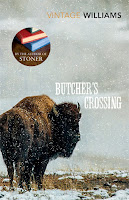
All the Time in the World E.L Doctorow (collection)
The Noise of Time Julian Barnes
The Hunger Games Suzanne Collins (YA)
The Stone Gods Jeanette Winterson
The Angaelien Apocalypse Matthew Chrulew (novella)
Fugue for a Darkening Island Christopher Priest
Diamonds from Tequila Walter John Williams (novella from Rogues ed. George R.R. Martin & Gardner Dozois)
Carnies Martin Livings
Heart of Darkness Joseph Conrad (novella)
Flaubert’s Parrot Julian Barnes
Reading Highlights and Standouts
Novel Highlights
I could have easily listed another dozen here. Ragtime by E.L Doctorow, Nutshell by Ian McEwan, The Daughter by Pavlos Matesis, The Sense of an Ending by Julian Barnes and Butcher's Crossing by John Williams, for instance, were all fab reads and, as mentioned, there were many more.
East of Eden by John Steinbeck
Arguably the best novel I've ever read. And I say this even though there is an unusual flaw in the novel: a sporadic first person voice intrudes at times, it's invasive and difficult to ascertain why it's used. Yet such is the scope of the work that this doesn't matter. Steinbeck incorporates melodrama, mystery, suspense, while also exploring villainy and heroism, love and hatred, loyalty and betrayal. What I think surprised me most was the humour and wisdom which came from the Irish and Asian characters. It's a wonderful exploration of not only the topography of Salinas Valley, but also the broader American identity, including the way it was morphing at the time. Wisdom in East of Eden comes from both within and from outside the traditional White experience. The new 'foreign' American migrant is extremely influential, to go along with the American drifter, and the more sturdy generational farmer. A true masterpiece.
Nights at the Circus by Angela Carter
Another now all time favourite. I loved The Bloody Chamber, but Nights at the Circus is even better. After a delightful start, the initial interview with the winged-wonder Fevers begins to grow ponderous, but after that Angela Carter really makes her mark here. The prose is rich and incredibly witty. Carter has such an incredible command of syntax and language that it's playful fun all the way through. I'd rate the work as the heir apparent to Virginia Wolfe's Orlando, yet Nights at the Circus surpasses Orlando: the language enjoys a few similarities, but Carter manages to keep it forever fresh, her structure and characters more alive and entertaining, and the narrative far more enticing. Nights at the Circus is a visionary work and a stellar achievement. The winged heroine Fevers is one of the all time great protagonists, her metaphorical dichotomy of being a winged landlubber is reflective of her dichotomous nature on so many levels. Like East of Eden, a masterpiece.
To Kill a Mockingbird by Harper Lee
No need for a lengthy comment on TKAM as everyone else has before me. I loved the fact that it wasn't a super tight narrative, but lightly meandered about. The voice of Scout, a combination of reflection and nostalgia, along with an innocent and honest childlike voice, works incredibly well. Deserves its critical acclaim. Harper Lee sadly passed away midway through my reading.
The White Tiger by Aravind Adiga
Although it won the Man Booker Prize, Adiga has come under severe criticism by those who say The White Tiger doesn't have the maturity or lyrical grandeur of novels by other Indian writers such as Rohinton Mistry, Kiran Desai or Salman Rushdie. The issue I have with these critics is that Adiga isn't trying to be poetic or lyrical - it's comparing apples with oranges. This is dark cartoonish humour and a scathing attack on capitalism, class inequality and corruption. The anti-hero – or some may say the villain – is fiercely intelligent, but also has a violent and wayward moral compass, yet this anti-hero takes on the unjust class system. As a reader we uncomfortably barrack for this morally corrupt, ambitious, intelligent, 'half-baked' psychopath for trying to move beyond his station as an 'Invisible' – one who originates from the poverty-stricken 'Darkness'. This work is dark, incredibly funny and a real page turner. It's a remarkably successful satire.
Anthology Highlights
I won't include the anthologies I've stories in due to bias.
The Best Science Fiction and Fantasy of the Year: Volume Six ed. Jonathan Strahan
Like any anthology, not all stories were to my taste, but when you discover several are up there with the best you've read, then it certainly counts as a highlight.
Very strong stories include: 'All That Touches the Air' by An Owomeyela, 'A Small Price to Pay for Birdsong' by K.J Parker, 'The Dala Horse' by Michael Swanwick, 'The Corpse Painter's Masterpiece' by M Rickert, 'The Paper Menagerie' by Kevin Liu, 'After the Apocalypse' by Maureen F. McHugh, 'Underbridge' by Peter S. Beagle, 'Relic' by Jeffrey Ford. 'The Invasion of Venus' by Stephen Baxter, 'The Catastrophic Disruption of the Head' by Margo Lanagan, 'The Book of Phoenix (Excerpted from the Great Book)' by Nnedi Okorafor, and the novella The Man Who Bridged the Mist by Kij Johnson is a strong and gentle moving story of engineering, love and change.
And then there are the absolute greats. I don't often do this, but I'd written a review on Goodreads, so I can dedicate a little time to each via the old cut and paste:
'White Lines on a Green Field' by Catherynne M. Valente is a wild, magical, animalistic portrayal of leaving year. The especially strong, evocative narrative voice howls out to readers in a tale of mythical and symbolic wonder.
'What We Found' by Geoff Ryman is another diamond. The story immerses the reader into the strong socio-cultural world of a Nigerian family. It successfully explores class and cultural rivalry, along with gender and family power relationships, all within the various substructures of Nigerian society. I'm now on the hunt for more of Ryman's work.
'Old Habits' by Nalo Hopkinson is a work that I've read before (along with 'Tidal Forces' by Caitlin R. Kiernan) in the anthology Eclipse Four, also edited by Strahan. This has to be one of the most underrated stories of our time. Set in the consumerist setting of a shopping mall, those who have died there only feel –in a sensory manner– when they relive their deaths each day, which they aptly label 'being on the clock'. These damned souls also occasionally prey on one another to sense briefly what it is to be 'human'. Entrapped within the mall, the characters come from a variety of marginalised societal groups.
Can the gay protagonist (a loving father with a witty sense of humour) step out of this purgatorial comfort zone into the dark unknown outside of the mall; and by doing so take his own leap of faith to be a better being? Utterly fantastic.
'Steam Girl' by Dylan Horrocks is a stunningly beautiful and emotional story about escapism and friendship. Horrocks pulled me in and never let me go. Pathos and pothos abound here. It also has this especially insightful line on the narrative craft: 'Some writers write to escape from reality. Others write to understand it. But the best writers write in order to take possession of reality, and so transform it.' Beautiful, isn't it?
'Restoration' by Robert Shearman is a fresh and cynical story that reminded me of George Saunders at his offbeat best. A couple are lost to time but not to love as they restore enormous paintings portraying single years in history. A quirky, ingenious tale by a superb writer.
Rogues Ed. George R.R. Martin & Gardner Dozois
A concept which appeals to me as I've always loved rogues in my escapist reading. It's a fun anthology, but it also has some real substance too.
Four more standouts (rest mentioned on Recommended Reads Short Story Reads of 2015 ) include: ‘The Caravan to Nowhere’ by Phyllis Eisenstein, ‘The Curious Affair of the Dead Wives’ by Lisa Tuttle, 'The Lightning Tree' by Patrick Rothfuss and ‘How the Marquis Got his Coat Back’ by Neil Gaiman. 'Now Showing' by Connie Willis is very good too.
Disappointments
Only two major ones this year. I'm a fan of Julian Barnes: his novel Arthur and George (my favourite of his works) along with his novella The Sense of an Ending, I'd happily recommend to any reader, but Flaubert's Parrot reads more like an academic exercise, as a result it is stiff, stilted and difficult to connect with. Mind you, Flaubert enthusiasts may think otherwise.
And the canonical Heart of Darkness just reaffirmed that there are so many gems outside of the supposed canon. Other than being able to chew the fat about Conrad's novella with fellow readers, and provide context for other texts (particularly films), reading it was a waste of time - unless you're up for a critical reading. Even Conrad claimed it was one of his lesser works.
Then again, the canon's TKAM truly impressed...
Publications
 I'm happy to have played a part in the anthology At the Edge Ed. Lee Murray & Dan Rabarts. My story 'Crossing' has been mentioned as a standout in The New Zealand Booksellers Blog, along with the leading NZ magazine The Listener. Nice to see other stories regarded as standouts elsewhere too – the reviews highlight a variety of different stories – I think this indicates the broad range of stories, their varied mood and genre, along with the overall high quality of the anthology's offerings.
I'm happy to have played a part in the anthology At the Edge Ed. Lee Murray & Dan Rabarts. My story 'Crossing' has been mentioned as a standout in The New Zealand Booksellers Blog, along with the leading NZ magazine The Listener. Nice to see other stories regarded as standouts elsewhere too – the reviews highlight a variety of different stories – I think this indicates the broad range of stories, their varied mood and genre, along with the overall high quality of the anthology's offerings. My story 'Lady Killer' from Bloodlines ed. Amanda Pillar will be in a Year's Best soon. The ToC hasn't been officially announced yet – I'll post it up when it does.
A lengthy opinion piece in The Guardian on McGowan's promise to legalise cage fighting in WA if elected. I'm following up with a longer piece with sports concussion experts in the US. I'll keep those interested updated.
Wishing you all a wonderful festive season. Eat, drink and love.
Subscribe to:
Posts (Atom)

















